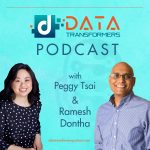
Episode Title : How to address the blind spots of data scientists
Episode Summary:
A good data scientist is not only good at coding, tweaking models but is also good at assessing the outputs of the models in the context of business decisions. As data scientists spend upto 80% of their time data munging, they will be better off spending some quality upfront time with the business leaders asking questions about the customer journey and how the data is collected along the way. Even though the data scientists are not expected to be business domain experts, they should think of their output in the context of business outcomes and communicate their results in business terms. The episode also emphasizes the need for all types and sizes of companies to get acquainted with analytics or fall behind.
B2C company Versus B2B company (01:00): Having come from a B2C company like Disney, Phil had to adapt to dealing with challenges of dealing with B2B company like Teradata. Each day could be different at Teradata as Phil would be talking one day to a video games company, next day a healthcare company, and a transportation company the next day. So Phil needed to learn to switch hats quickly.
Business focus first, Data focus next (04:00): Majority of a data scientist’s time (upto 80%) is spent on data wrangling and a maximum of 20% on actual model development & tweaking. So a data scientist’s time is well spent initially talking to the business units on 3 things: (1) What data is collected (2) What is the customer journey (3) When and how is the data collected along the journey? The more time spent in clarifying these questions, the better it is for the team.
Blind spots of data scientists (09:02): Majority of the data scientists do not focus on the business processes or attempt to understand the business domain and that is a mistake. Yes, it is true that the businesses know their domains better than anyone else but the data scientist should attempt to put the data in the context of the business domain and not look at it independently.
A solution that is appropriate for their business (11:06): Businesses should evaluate technology solutions which are relevant for their business based on their current state of business. Phil gives an example of hiring an expert from the casino industry while at NBC Universal and the solution proposed was ahead of its time and not suitable for NBC. And that was a mistake.
Analytics best practices (15:12): Every company should look at using analytics in their business or otherwise they’ll be left out. They can start with a small test data set but should start somewhere. Engage with an external company on a small project to get upto speed before building a data team. Then the business can start assessing if they want to continue relying on external teams or have a centralized/distributed teams internally.
What’s ahead (20:00): Data science and AI will continue to grow and become important. People wanting to come into the industry to become data scientists should keep learning code, models, and algorithms. They should also try to put their technical expertise in the context of what does it mean for the business? What can or should the business do with the outcomes of the models? And they should be able to communicate the technology outcomes in the content of business outcomes.
Resources mentioned in this episode:
Podcast website: https://datatransformerspodcast.com
Data Transformers Podcast
Join Peggy and Ramesh as they explore the exciting world of Data Management, Data Analytics, Data Governance, Data Privacy, Data Security, Artificial Intelligence, Cloud Computing, Internet Of Things.
